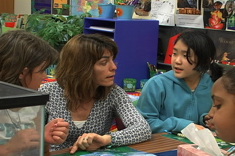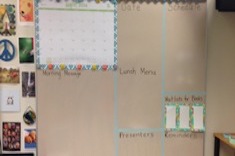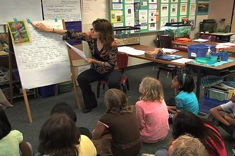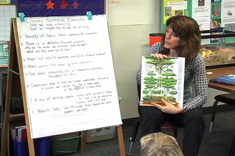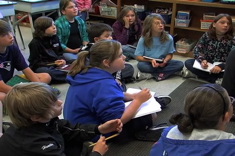If you were to visit my classroom on any Monday morning, students would beg you to join us for Expedition Monday. What would this opportunity mean for you?
ex·pe·di·tion
NOUN: A journey undertaken by a group of people with a definite objective: an expedition against the enemy stronghold; a scientific expedition to the South Pole.
The thesaurus offers this collection of words: a journey undertaken with a specific objective: pilgrimage, safari, tour, trek, voyage.
Discoveries. Voyages. Safaris. Expeditions.
These are words full of images, excitement, and possibilities.
What might that mean for my students?
Expedition Monday is our weekly journey in search of nonfiction resources. As a class we share a definite objective: we want to discover and celebrate nonfiction resources that could make a difference in our thinking. As 21st century learners, both digital immigrants (me) and digital natives (the kids), we enjoy exploring the media ecosystem that surrounds and shapes our learning lives.
How did this routine and ritual become a part of our classroom?
Expedition Monday evolved from my wonderful experiences with Poetry Friday, a classroom ritual and Reading Workshop routine that provides time every Friday to simply share, read, and enjoy poetry. Expedition Monday is based on the same purpose and practices as Poetry Friday.
I came across the idea of a weekly time scheduled to showcase nonfiction resources while reading professional books and teacher blog sites. The weekly nonfiction ritual was commonly referred to as First Facts Monday. The name didn't excite me, but the process captivated me. After playing around with dictionary definitions, my students and I decided that the name, Expedition Monday, had more pizzazz and greater possibilities. "Nonfiction is way more than just facts!" stated one determined, nonfiction-loving reader.
I lifted the practice, changed the name and VOILA! Expedition Monday became a part of our learning community, a weekly routine and ritual designed to bring nonfiction resources to the attention of my students. After adding Expedition Monday to our week, I am constantly amazed how this routine has enriched and extended the diverse strengths and needs of my students.
Simple in nature, Expedition Monday incorporates the workshop elements of sharing, time to read, independent choices, and community. Our intention is to discover the unlimited supply of nonfiction resources that surround us. Children are simply given time to explore self-selected topics free from the guidelines of our content studies. The effects of this routine and ritual have been far reaching, and just like Poetry Friday, have made a significant difference in the lives of my students.
What does Expedition Monday look like?
We launch Expedition Monday as a class, gathering in the community area with our Reader's Notebooks in hand. Just like explorers in search of new discoveries, we are hunting for interesting nonfiction resources. We begin with the sharing stage.
Expedition Monday launches during our Morning Meeting. Each day, two students share a favorite or intriguing nonfiction resource through a Morning Meeting ritual called, "Our Living Minute." Two students share and discuss their favorite resources, each student having one minute to tell about a selected resource followed by three peer comments and questions. This takes around 5-10 minutes.
When the children are finished, I unpack my backpack, full of my nonfiction finds from the past week. I highlight and showcase new books and magazines purchased or borrowed for our classroom library. I talk about why I selected certain resources and why certain readers would find them interesting. I show the children websites with resources I think they will find intriguing. I even pass out specific books, magazines, or articles to individual children if I know a resource matches a child's interests. I try to unpack my bag and highlight the resources in five minutes to keep our share time moving along.
In addition to new resources, revisiting familiar resources is important so I highlight and review one or two nonfiction book tubs or magazine collections from our classroom library. These are established classroom resources that students might overlook as they grow familiar with our classroom library. My students gravitate to animal and habitat tubs, so I help them step out of "reading ruts" and rediscover other resources. Sharing old favorites is lively and fast paced, taking no more than five minutes.
I try to expand our Expedition beyond the four walls of our classroom. Rather than always sharing my selections, I share Book reviews and recommendations from significant people outside our learning community can influence our reading lives. I try to get a few familiar people, family members, teachers, students from other classes, and my friends to recommend nonfiction resources.
We view recommendations from favorite teacher and kidlitosphere blog sites, reading reviews of many different resources. My students and I capitalize on the links to sources like Amazon (http://www.amazon.com) and Powell's Books (http://www.powells.com) checking out reviewed books, looking at book covers and perhaps discovering a virtual sneak peek inside the book. Children enjoy hearing what other important people are reading and the Web offers so many ways of widening our Expedition territories.
The entire sharing stage of Expedition Monday takes 20-30 minutes. As we discover new titles, rediscover old favorites, read book reviews, or revisit a classroom collection, students create a possible "to read" list in their Reader's Notebooks, keeping track of nonfiction titles they would like to read. Their ever-growing lists serve as a resource for independent reading time during our Expedition Mondays or our regularly scheduled Reading Workshop times.
From Sharing to Discovery
The sharing stage is followed by discovery time. Students are motivated to check out new titles, explore classroom resources, and start a reading pile for today's Expedition. To dismiss the group, students informally vote on an Expedition read aloud, one of the resources from sharing time. After arranging the new resources along the easel's edge, we tally votes as children leave the carpet for book discovery time. When the read aloud is selected, I place the other new resources in our ever-changing nonfiction resource display. This display serves as a visual reminder, keeping titles fresh in readers' minds while making them readily available to students.
Moving from the sharing stage to discovery time, students go "book hunting" and select two or more resources for their Expedition's reading pile. If they plan to visit a website, they record the site name on a post-it note. Students are not restricted to their initial selections, but it helps them to focus their reading choices as they prepare for the independent reading portion of Expedition Monday.
Once resources are selected, I judge the energy of my students. Some days, we select books and move right into our independent reading time. On other days, we gather together again to read and discuss the class' selected resource. Independent reading would then follow our read-aloud time. The flow of the morning depends on the needs of the group.
During all stages of the Expedition – sharing, discovery, independent reading and read aloud time – students use their reader's notebooks. During the sharing stage, students record the titles that interest them. If they see a book reviewed on the web and we don't have the title in our classroom, they can take their notebooks to the library to search for the book. When students are sharing resources, students record their questions and comments.
When I read aloud, students capture their thoughts, questions and wonders in their notebooks. As students read independently, they decide how they can track what they've read. Some children create a weekly list of resources. Other children record dash-facts about their selected topics. Different resources call for different recording strategies. Drawing models, labels and photocopied pictures, lists of wonder questions. . .each child's expedition is documented in a different way.
As a result of Reading Workshop, students are equipped with different recording strategies. Expedition Monday provides authentic opportunities for students to apply the recording strategies they deem most useful.
After discovery time, read aloud, and independent reading time, we end our journey with Small Group shares. Rather than debriefing with the whole class, children gather in ever changing groups of 3-4 people and share a resource, question, or amazing fact discovered during Expedition Monday. Then students complete a share card to celebrate a resource, question, or idea they have for future expeditions, posting their share card on the Expedition board. The children often refer to the board as they read and write throughout the week if they need ideas or inspirations.
An expedition is defined as a journey with a definitive purpose. Expedition Monday reflects our collective efforts to learn and grow as readers in a workshop classroom. Simple in nature, Expedition Monday incorporates the workshop elements of time, independent choices, and community. You gather resources together; a community spends time sharing the wealth. You read and talk about amazing topics. Predictable structures, routines and rituals allow amazing experiences to unfold.
Where did you and your students travel today?

